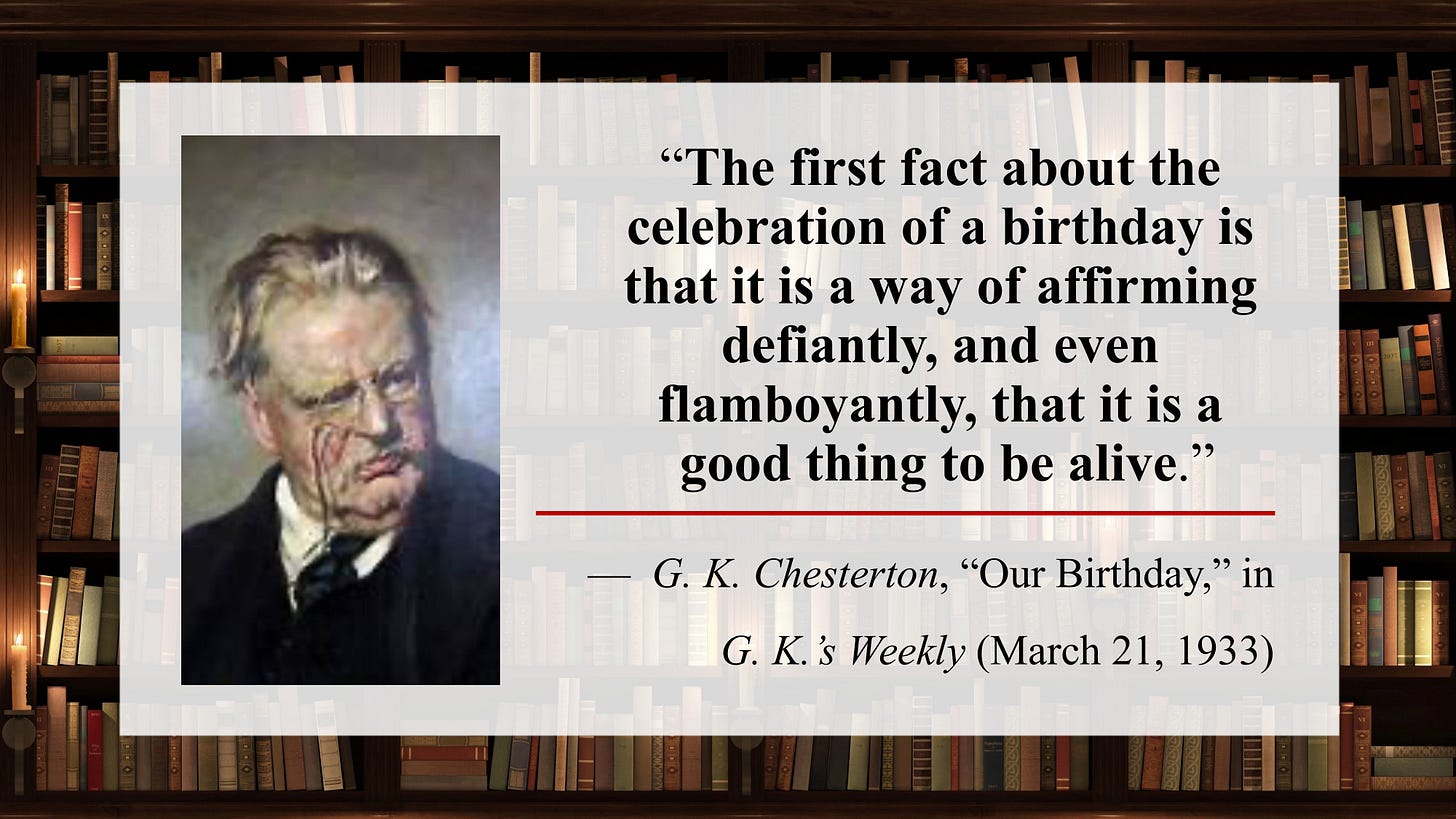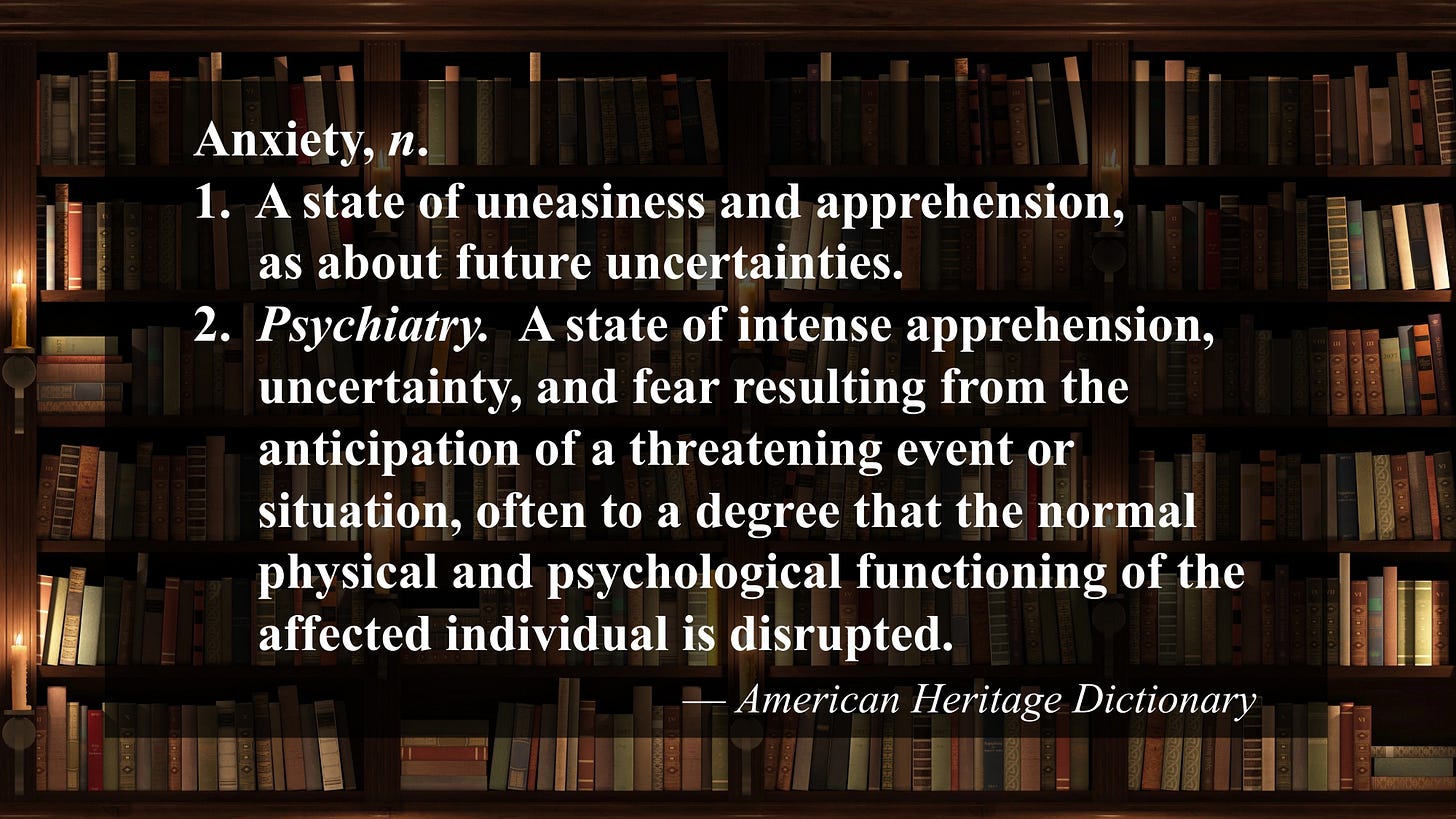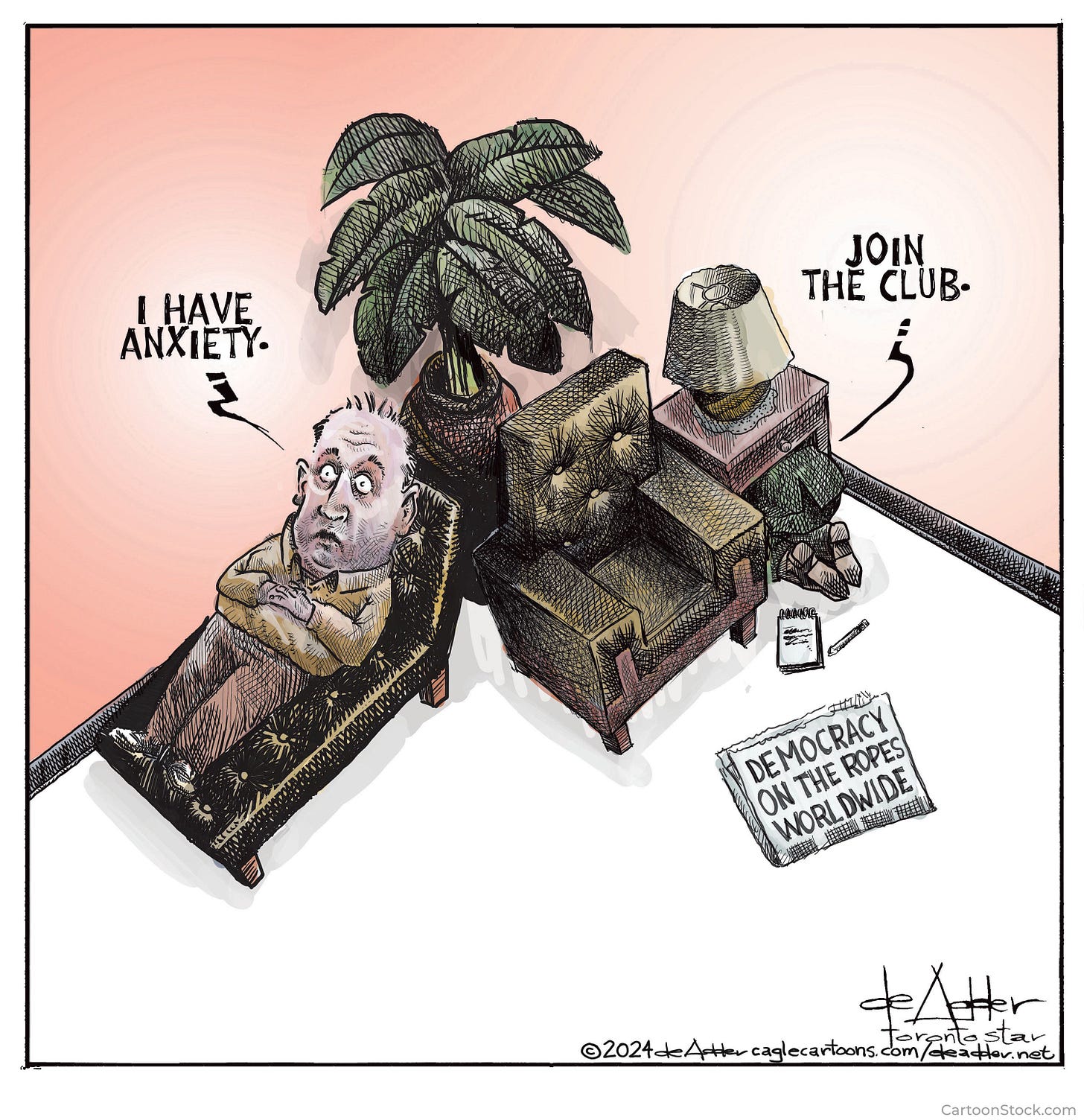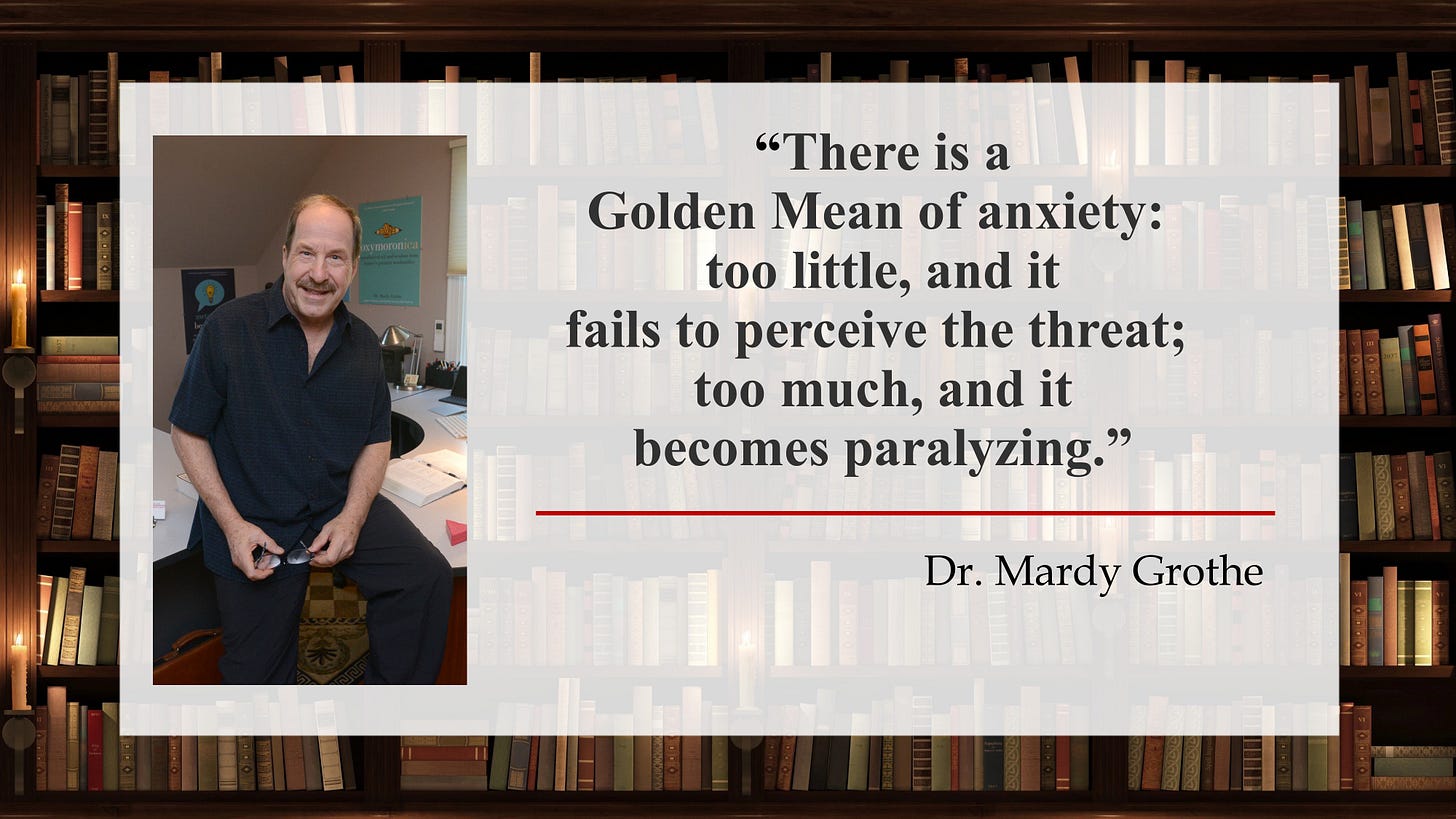Dr. Mardy's Quotes of the Week ("Anxiety")
April 27-May 3, 2025 | THIS WEEK'S THEME: “Anxiety"
Happy Birthday to Me!
On May 2nd, I’ll be celebrating my 83rd birthday! Exactly thirty years ago, at age 53, I experienced more than a little anxiety when I was diagnosed with a malignant prostate cancer. A radical prostatectomy removed the gland, and—happily—there was no sign of metastasis. I vowed I would never again have a bad day, and that has pretty much proved to be the case.
Earlier this year, I had another brush with mortality when my heart’s rapidly deteriorating aortic valve was replaced with a state-of-the-art prosthetic device crafted from space-age materials and bovine tissue. The TAVR procedure not only repaired a dying heart, it rekindled in me a commitment to live the remainder of my life in the healthiest and most productive way I can.
Given my recent experience, I can’t think of a better observation on the subject of birthdays than this one:
Opening Line of the Week
In this beautiful—and bittersweet—opener, Clift leads readers down an idyllic path until, at the end, she ingeniously departs from it. Her essay explored one of the most painful themes in human life: how to cope when one’s own mother is deficient in meeting her child’s deep emotional needs. In the article, Clift continued:
“I lived across the street in a house that became a place of illness, loneliness, and ‘quiet despair.’ My mother’s chronic depression began there as my father’s tense nature worsened when business failures mounted. So I began to virtually reside in the perfect Cape Cod cottage and to make of myself a part of that Dick-and-Jane family, to internalize their traditions, to survive my childhood pain.”
For more than 2,000 memorable opening lines from every genre of world literature, go to www.GreatOpeningLines.com.
This Week’s Puzzler
On April 21, 1909, this man was born in Ada, Ohio. Since I was given a somewhat unusual first name at birth—Mardell—I was intrigued when I first learned about him and his strikingly unusual name.
After getting his B.A. from Oberlin College, he taught for several years before getting a bachelor of divinity degree from Union Theological Seminary in 1938. He worked as a pastor for several years before deciding his true passion was psychology. After entering the clinical psychology graduate program at Teachers College, Columbia University (also my alma mater, by the way), he received his Ph.D. in 1949. A year later, he published The Meaning of Anxiety, a pioneering book based on his doctoral dissertation.
I was introduced to his work during my graduate school days, when The Meaning of Anxiety and several other works—Man’s Search for Himself (1953) and Psychology and the Human Dilemma (1967)—made a profound impression on me. As the years went by, he continued to write psychology books aimed at a general audience, including Love and Will (1969) and The Courage to Create (1975). In 1994, he died of congestive heart failure at age 85 in his home in Tiburon, California.
Over the years, he offered memorable observations on innumerable topics, and some of his best were on this week’s theme:
“Anxiety is essential to the human condition.”
“Anxiety is not merely an abstract theoretical concept, any more than swimming is to a person whose boat has capsized a mile from shore.”
In The Meaning of Anxiety, he also offered two observations that attempted to capture the essence of anxiety:
Who is this person? (Answer below)
What is Your Current Level of Anxiety?
The American Heritage Dictionary defines anxiety this way:
To better understand the nature of anxiety, it may be helpful to contrast it with apprehension, worry, and fear. These are all troubled states of mind, to be sure, and they all represent a way we react to something that might be harmful, dangerous, or inimical to our well-being.
Apprehension. Apprehension is the uneasy feeling you might have before a job interview, a big test, or a particularly difficult conversation. It’s typically milder and more specific than anxiety. With apprehension, you’re generally quite sure about what’s bothering you, and why.
Worry. Worry occurs when the mind is preoccupied with the potential negative consequences of specific events, like “What if I lose my job?” or “What if I fail the qualifying exam?” In worrying, there is persistent fretting and a scenario-spinning quality that The American Heritage Dictionary so beautifully described as “to turn over in the mind moodily and at length.”
Fear. Fear occurs when we perceive an immediate and identifiable threat, like an approaching pit bull with a low growl or a menacing figure emerging from the shadows. With fear, it’s like an alarm going off or someone yelling “Danger!” Our autonomic nervous system goes into high gear and our brain immediately mobilizes the body for action—often expressed as fight or flight.
Compared to these three states, anxiety is broader, deeper, and generally harder to resolve. Anxiety tends to arise from threats that are more diffuse in nature, and especially those that contain a large element of uncertainty.
Uncertainty Leads to Anxiety
It is an axiom of psychology that uncertainty leads to anxiety. Human beings have a deep need to live in a world where the future looks reasonably stable, and where we believe we can influence what happens to us. When this is no longer true, the result is anxiety: a state of inner tension that signals something essential is at risk.
So, to return to the Puzzler quotation:
“Anxiety is the apprehension cued off by a threat to some value which the individual holds essential to his existence as a personality.”
In this observation, this week’s Mystery Man captured the essence of what it feels like to live in an age when (1) bedrock assumptions about the way things are no longer apply, and (2) people fear that something important is in danger of being lost. For millions of Americans, this kind of anxiety is no longer theoretical. It is real, it is widespread, and it is intensifying.
A New Age of Anxiety
In 1947, W. H. Auden published “The Age of Anxiety,” a Pulitzer Prize-winning poem about human life in the the aftermath of World War II. The title became shorthand for a deep spiritual anxiety that characterized people who no longer had strong religious institutions to guide them.
In the second presidential term of Donald Trump, I believe we’ve entered a new Age of Anxiety. It could have happened in his first term, but it didn’t because he was new to the job and his worst impulses were held in check by a number of close advisors who began to be described in the press as “the adults in the room.” In a second Trump term, we’re witnessing a Trump without restraint. This week, Time magazine described it this way:
“The first 100 days of his second term have been among the most destabilizing in American history, a blitz of power grabs, strategic shifts, and direct attacks that have left opponents, global counterparts, and even many supporters stunned.”
After his inauguration, Trump quickly launched a blizzard of head-spinning initiatives—many outlined in the The Heritage Foundation’s Project 2025 book that he denied knowing anything about during the campaign. I won’t take the time and space to detail his many actions here, but let me just say that his efforts have been so cataclysmic they are now routinely being compared to Mao Zedong’s “Great Cultural Revolution” in the 1960s and 70s.
The result has been a destabilization of America, and we now see a country in which high anxiety is being experienced by: (1) older Americans who can no longer take for granted the existence of Social Security and Medicare; (2) low-income Americans who’ve depended on Medicaid, SNAP (formerly “food stamps”), WIC, and other critically important “safety net” programs; (3) dedicated public school teachers who continue to educate our young people even as the very idea of public education is under assault—and the entire Department of Education is in danger of being eliminated; (4) disabled Americans—and the parents of autistic and other “special needs” children—who rely on a huge array of government-sponsored services.
This is already a fairly extensive list of existential threats, and so far I haven’t even mentioned how Trump’s reckless tariff policies have rocked the stock market, wiping out billions of dollars in retirement savings and dramatically increasing the chances of a major economic recession. Or Trump’s so-called “peace plan” that would stab Ukraine in the back while giving Putin everything he wants. Or his bombastic threats to annex Canada, take Greenland by force, or seize control of the Panama Canal. Or his ongoing attempts to bully law firms and universities into subservience. Or his administration’s actions to arrest suspected illegal immigrants on the basis of flimsy “hearsay” evidence—and then to deny them their constitutional rights to due process and legal representation.
Over the past three months, our world has significantly changed, and if there were such a thing as an American Anxiety Index—a psychological barometer akin to the Consumer Confidence Index—we’d probably be looking at numbers not seen since the darkest days of the Great Depression. The signs are everywhere, and they are not simply expressions of discontent. This past week, David Brooks, the conservative columnist for The New York Times, expressed it well:
“What is happening now is not normal politics. We’re seeing an assault on the fundamental institutions of our civic life, things we should all swear loyalty to—Democrat, independent or Republican. It’s time for a comprehensive national civic uprising.”
Happily, we’re beginning to see the first stages of such an uprising in the increasing number of Americans who are vociferously expressing their feelings in town hall meetings and protest demonstrations around the country. Perhaps it’s time for you to join in.
And if you’re one of the 99% of voters who’s never called your senator or congressperson, you might want to consider doing that as well. Simply call the Capitol Switchboard at 202-224-3121. All you have to do is ask to be connected to your representative’s office. It’s that simple.
Brooks’s call for a civic uprising dovetails nicely with something psychologists have long believed: the antidote to anxiety is action. To move from anxiety to action means answering the question what do I truly value? And when you finally do act—by demonstrating, organizing, donating, and, of course, voting—you prove the wisdom of two other observations from this week’s Mystery Man:
“A person can meet anxiety to the extent that his values are stronger than the threat.”
“Anxiety is not a sign of sickness but a sign of health—if it awakens in us the urge to live at a deeper level.”
This week, think about what you can do to cope more effectively with the anxiety you’re feeling about what’s happening to our beloved country. Before doing anything, though, take a few moments to reflect on this week’s compilation of quotations on the theme:
Anxiety is the space between the “now” and the “then.” — Richard Abell
Anxiety is the handmaiden of creativity. — T. S. Eliot
Comforting formulas for getting rid of anxiety may be just the wrong solution. Books about “peace of mind” can be bad medicine. To be afraid when one should be afraid is good sense. — Dorothy Fosdick
Money is a singular thing. It ranks with love as man’s greatest source of joy. And with death as his greatest source of anxiety. — John Kenneth Galbraith
Stupidity is without anxiety. — Johann Wolfgang von Goethe
Anxiety is the dizziness of freedom. — Søren Kierkegaard
Most people today don’t want honest answers insofar as honest means unpleasant or disturbing. They want a soft answer that turneth away anxiety. They want answers that are, in effect, escapes. — Louis Kronenberger
Anxiety is the mark of spiritual insecurity. — Thomas Merton
Anxiety and depression are tolerable if we don’t get anxious and depressed about being anxious and depressed. — Theodore Isaac Rubin
Without anxiety life would have very little savor. — May Sarton
For source information on these quotations, and more observations on the theme of ANXIETY, go here.
Cartoon of the Week
Answer to This Week’s Puzzler
Dr. Mardy’s Observation of the Week
Thanks for joining me again this week. See you next week, when the theme will be “Live Like You Were Dying.”
Mardy Grothe
My Two Websites: www.drmardy.com and www.GreatOpeningLines.com
Regarding My Lifelong Love of Quotations: A Personal Note












Happy Birthday, lucky you as I'm one year older! :-). I do enjoy your emails every week, however, I would love it if you would keep Politics out of it! I'm a strong Republican and obviously you loved what Biden did the last 4 years of his incapacitated state of mind. At least this President is trying to do something and it would be good if we would give him an opportunity and then next election you can open the "border" again.
I wrote this to celebrate my 84th Birthday. It's a close approximation of your experience (83years - you're a mere youth to me.) Happy natal day, my friend, and many more.
Wrap your head around this: At 18.5 miles a second, or 67,000 mph, the Earth, with me on it, travels about 584 million miles around our sun each year. That’s 1,598,878.59 miles per day. One sidereal year takes 365.256 days. I know because both Google and Wikipedia confirmed it. That yearly mileage number again, is roughly 584,000,000 miles in a slightly elliptical orbit. Having reached my 84th birthday, that means that so far, I’ve traveled 48,471,999,856.33 miles, or 83 transits around Sol in my lifetime. Looking at that staggering 48.472 trillion miles number another way, that’s about 100,983,333 (approximately101 million) trips to our moon (240,000 miles each way) and back. However, the “and back” can’t happen. I’m on a one-way trip. So far, my life’s journey has taken 30,316 days. I still remember events in some of them!
So, when I tell you, “I’ve been around!” Believe me.
Skip the happy birthdays and wish me a good trip. Or, for the compulsives among you, check my math.